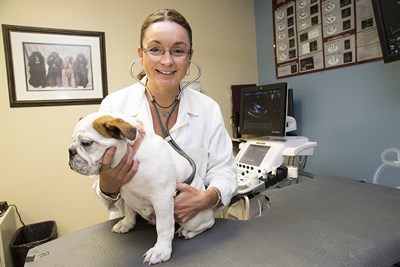Dr. Sonya Gordon: Getting to the Heart of the Matter
What is music to Dr. Sonya Gordon‘s ears? Hearing the “lub-dub, lub-dub” from a healthy canine heart. Through her research, Gordon tackles some of the important questions in veterinary cardiology, all so she and other veterinarians can hear the beating of their patients’ hearts for a longer time.

Gordon’s work in the Department of Small Animal Clinical Sciences at the Texas A&M College of Veterinary Medicine & Biomedical Sciences (CVM) is transforming discovery into innovative treatment by helping veterinarians everywhere more effectively treat canine cardiac disease. Gordon calls this “top-down research,” which is the identification of treatments and diagnostic tests that help primary care veterinarians do a better job caring for their patients.
Recently, Gordon helped identify an effective treatment for mitral valve disease (MVD) in dogs. Now, Gordon is on to the next step, applying and disseminating those research results. As an educator, she teaches students and fellow veterinarians about these new and effective treatment options, and as a clinician, she offers state-of-the-art treatment to her patients-all in the name of improving the hearts and lives of dogs and their owners.
Treating Mitral Valve Disease
Gordon’s research focuses on MVD in dogs, which accounts for more than 75 percent of all canine heart disease. The condition is characterized by the degeneration of the mitral valve, which, in turn, hinders the heart’s ability to adequately pump blood through the body, ultimately leading to heart failure in many dogs.
Gordon was part of a research team that led the largest prospective study in veterinary cardiology to date, the EPIC Study, and the results were revolutionary. The findings demonstrated that the drug pimobendan effectively delays the onset of clinical signs of MVD and extends overall survival.
In humans, this condition is typically managed by surgical repair of the valve. While surgery is an option for some dogs, availability and cost currently limit its clinical utility. However, according to Gordon, many dogs will now benefit from earlier treatment with pimobendan.
“The results of the EPIC trial will change the way the most common cause of heart disease and heart failure in the dog is managed on a day-to-day basis by veterinarians around the world and will contribute to dogs with MVD living better and longer,” Gordon said.
In the EPIC trial, pimobendan delayed the onset of congestive heart failure secondary to MVD for an average of 15 months, or 60 percent; so, while pimobendan is not a cure, it is a way to manage the condition and allow dogs to live longer and more enjoyable lives. Gordon said this research means that more dogs will “die with valve disease, not from it.”
“We’ve known for a long time how to treat dogs with congestive heart failure. Previous studies have proven which therapies work, resulting in strong evidence-based recommendations and guidelines. In addition, it’s easy to identify which dogs have MVD even before they develop congestive heart failure,” Gordon said.
“However, until recently, there was no proof that starting a medication before a dog with MVD developed congestive heart failure could change what was going to happen, and, therefore, there were no evidence-based guidelines for the asymptomatic stage of MVD,” she said. “Evidence-based medicine is the ultimate goal in veterinary cardiology, and I think it’s nice to be able to contribute the kind of data that allows that to happen.”
A New Standard of Care

Gordon’s research is part of a growing trend toward using the results of well-designed clinical trials to make evidence-based recommendations in veterinary medicine, something that has long been the standard in human medicine.
The EPIC study represents the epitome of the type and extent of the impact that a well-designed clinical study can have; it is in the top 5 percent of all research outputs, resulting in more than 12,000 downloads in the first three months following publication, according to Gordon.
The impact of the EPIC study will continue in many ways over the coming years, as it is incorporated into updated guidelines, the curriculum at veterinary schools, and continuing education lectures for veterinarians. However, the ultimate influence the study has on the practice habits of veterinarians with respect to how they treat the most common cause of heart disease in the dog will be its lasting legacy. Many dogs will experience a relevant extension in symptom-free and overall survival, a benefit that will undoubtedly be enjoyed not only by the dogs but also by their families, Gordon said.
“I now get to talk to aspiring young veterinarians about the fact that the recommendation of when to start pimobendan in dogs with MVD is now based on evidence and not just opinion; that’s pretty nice,” she said.
Continuing Research via Collaboration
As a native Canadian, Gordon became aware of the supportive community within the CVM when she was welcomed as an integral part of the staff in 1998. Since then, she has been part of a team of cardiologists and technicians at the CVM and helped train 13 cardiologists. She also works collaboratively with a wide network of local, national, and international veterinary cardiologists, all of which contribute to her ability to tackle big challenges.
“The reason we’re successful here (at the CVM) is because we have three cardiologists, three cardiology residents, two dedicated technicians and a dean, department head, and hospital director who think what we do is important,” she said. “If none of that existed, if you didn’t have a supportive environment, it would be really hard to take part in the kind of things we’ve had the luxury of taking part in. It’s exceedingly rewarding to be part of a progressive cardiology service and a global community of cardiologists all working together to advance our understanding of cardiac disease.”


